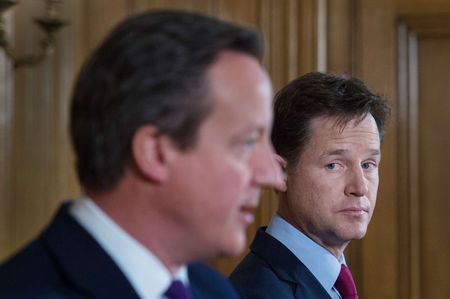BEIJING (Reuters) - China issued a formal complaint to Britain on Wednesday after Deputy Prime Minister Nick Clegg met Hong Kong pro-democracy activists campaigning against Beijing's tightening control of the former British territory.
Hong Kong reverted to Chinese rule in 1997 under a "one-country, two-systems" deal ensuring it a high degree of autonomy. But pro-democracy campaigners have warned of the erosion of the city's freedoms and are pushing for the direct election of its leader by universal suffrage in 2017.
Clegg's office said he met veteran activists Anson Chan and Martin Lee on Tuesday, with Chan and Lee raising concerns over China's jurisdiction of the region, and questioning Britain's commitment to Hong Kong's democratic development.
Asked about the meeting, Chinese Foreign Ministry spokesman Hong Lei said China was firmly opposed to any foreign interference in its internal affairs on any pretext.
"The UK's actions are an interference in China's internal affairs. China expresses strong dissatisfaction," Hong said in a statement posted on the ministry website.
"China urges the UK-side to earnestly respect China's stance and concerns, abide by its promises ... and take practical efforts to safeguard China-UK relations and bilateral cooperation," Hong said.
While Beijing says Hong Kong can go ahead with a vote in 2017 for the city's leader, Hong Kong's mini-constitution, the Basic Law, specifies that only a nominating committee can pick leadership candidates.
Democracy activists fear that the committee will essentially keep opposition candidates out of the running by stacking the poll with Beijing loyalists.
"The UK remains fully committed to the Joint Declaration and we will not shy away from defending the principle of 'One Country, Two Systems'," Clegg said in a statement.
"The important thing is that the people of Hong Kong have a genuine choice and feel that they have a real stake in the outcome of the 2017 election."
British media said Clegg, the leader of the coalition's junior partner the Liberal Democrats, had criticised British Prime Minister David Cameron for prioritising trade with the world's second largest economy over democracy in Hong Kong.
A source close to Clegg said Cameron's Conservative Party had become "so deferential in their attitude to China" they would not stand up for democracy in Hong Kong.
The extent of democratic reform in Hong Kong is increasingly becoming a flashpoint. The standoff intensified last month when Beijing published an unprecedented cabinet-level white paper bluntly reminding Hong Kong that China remained in control.
Hundreds of thousands of people marched through Hong Kong on July 1 in support of full democracy, demonstrations that followed an unofficial referendum on democracy in which nearly 800,000 voted.

Chan, a former senior Hong Kong official, and Lee, one of the founders of the Hong Kong opposition Democratic Party, met U.S. Vice President Joe Biden at the White House in April, in one of the most high-profile attempts to flag Hong Kong's democracy concerns internationally.
(Reporting by Michael Martina; Editing by Robert Birsel)
